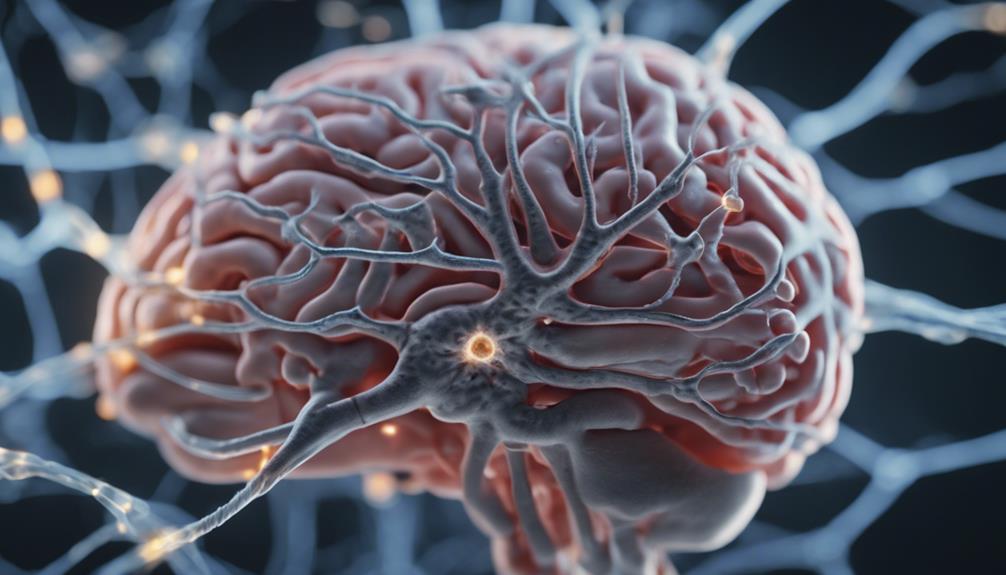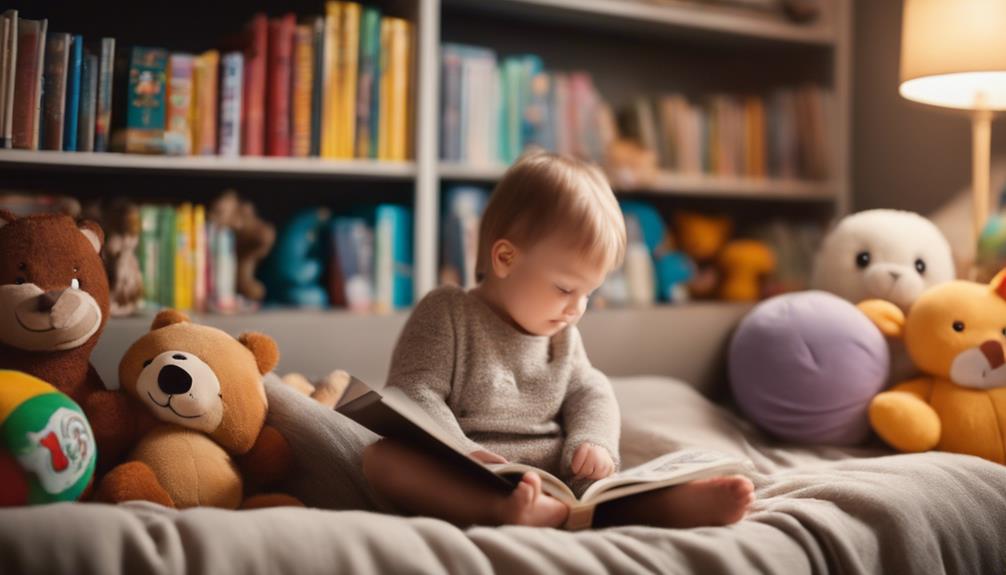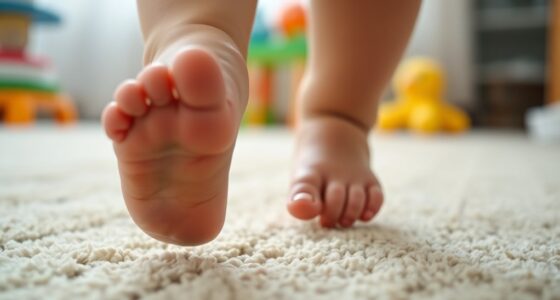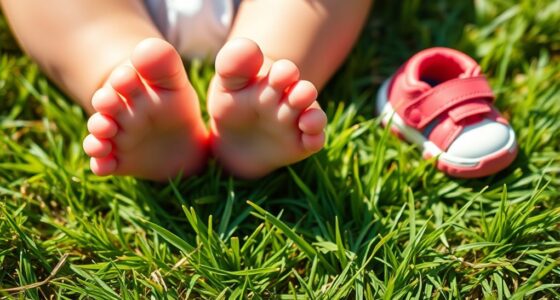Understanding baby nervous system development is crucial for their cognitive and motor skills. Neural circuits are formed based on experiences, which are essential for growth. The closure of the neural tube at 6 weeks is important for protecting the brain and spine. By 12 weeks, significant reflexes begin to emerge. Myelin, crucial for nerve function, starts to develop at 20 weeks. Genes can play a role in development, with conditions like Down syndrome affecting the nervous system. Providing a nurturing environment, engaging in sensory play, and participating in music activities all contribute to healthy growth. Omega-3 and folic acid are beneficial for development. It’s important to watch for signs of trauma such as excessive crying. Consulting with healthcare professionals is vital for ensuring optimal growth.
Key Takeaways
- Early experiences shape neural circuits.
- Sensory play enhances nerve development.
- Genetic factors influence nervous system growth.
- Nurturing environment supports brain wiring.
- Omega-3 and folic acid aid brain development.
Importance of Nervous System Development
Understanding the significance of nervous system development in babies is essential for their overall well-being and future cognitive and motor skills. During early childhood, neural circuits in the nervous system are actively forming and wiring themselves based on experiences and environmental stimuli. This process is critical for the proper functioning of essential bodily functions like breathing and heartbeat in newborns.
Supporting healthy nervous system development in babies through activities that stimulate neural connections is imperative for their growth and development. Early childhood education plays a significant role in shaping these neural circuits by providing a rich learning environment that fosters cognitive and motor skill development.
Evaluating the function of lower neural centers through reflex tests like the dolls eye maneuver and Moro response helps gauge the maturity of the nervous system in infants. By prioritizing the nurturing of nervous system development in babies, we can set a strong foundation for their future well-being and success.
Stages of Nervous System Growth
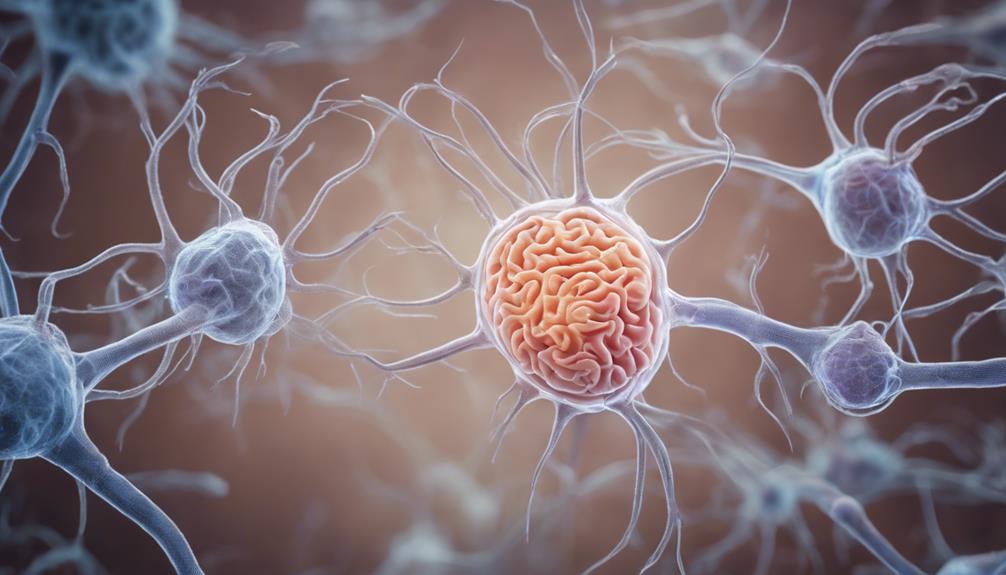
As the nervous system develops in a baby, early stages involve the formation of the neural tube and key milestones in brain development.
By 28 weeks, intricate connections between nerves and organs are established to facilitate sensory functions.
Early Neural Tube Formation
During early neural tube formation, the foundation of the nervous system is established through an essential process that includes the closure of the neural tube at both ends by 6 weeks post-conception. This marks a critical stage in the development of the fetal nervous system. Here are some key points to help you understand this pivotal phase:
- Closure of Neural Tube: The neural tube closes at both ends by 6 weeks, ensuring the protection and development of the spinal cord and brain.
- Nervous System Communication: By 8 weeks, a network of nerves extends throughout the body, setting the stage for future communication within the nervous system.
- Fetal Nervous System Reflexes: At 12 weeks, essential reflexes crucial for survival and further development begin to emerge in the fetal nervous system.
- Myelin Development: Myelin, the protective sheath around nerves aiding in efficient signal transmission, starts to form at 20 weeks, enhancing nerve function.
Understanding these early stages of neural tube formation provides insight into the intricate development of the baby's nervous system.
Brain Development Milestones
Key brain development milestones mark significant stages in the growth of the nervous system, showcasing the remarkable progression of neural functions.
The brain develops rapidly in the first few weeks of pregnancy, with the neural tube forming at three weeks post-conception. By six weeks, the closure of the neural tube is an important milestone, ensuring the protection of the spinal cord.
Key reflexes begin to develop by 12 weeks, indicating the early stages of nervous system functionality. Around 20 weeks, myelin development commences, aiding in the efficient transmission of nerve signals.
At 28 weeks, senses such as hearing, smell, sight, and touch become operational as the brain further matures. During pregnancy, proper nutrition, folic acid intake, and prenatal care are essential for promoting healthy brain growth.
As the fetal brain continues to develop, nerves branch off the spinal cord to relay messages and establish connections with organs for the functioning of senses.
Factors Influencing Development
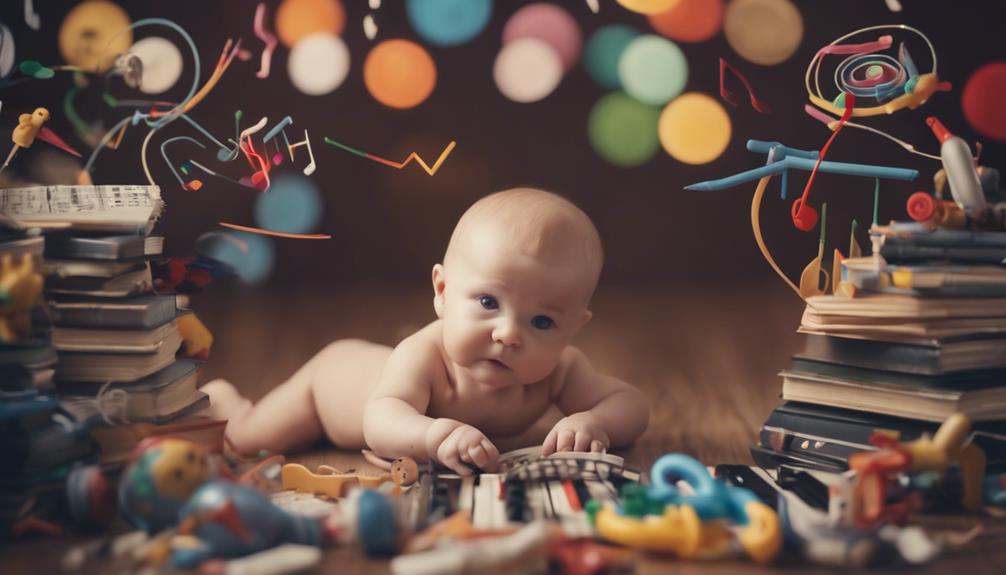
Genetics play a significant role in shaping your baby's nervous system development, influencing various aspects of growth.
The environment surrounding the baby, including exposure to toxins and maternal stress, can also impact how the nervous system progresses.
Understanding the timing of key milestones is vital in ensuring the best possible development for your little one.
Genetic Influences on Development
Understanding how genetic influences shape the development of the baby's nervous system is essential for predicting potential risks and guiding healthcare decisions. Genetic influences play a significant role in the formation of the baby's nervous system.
Here's what you need to know:
- Inherited Traits: Traits passed down from parents can impact the baby's nervous system development.
- Genetic Disorders: Conditions like Down syndrome or Tay-Sachs disease can affect the baby's nervous system due to genetic factors.
- Gene Mutations: Changes in genes can lead to alterations in the baby's nervous system development.
- Genetic Testing: Utilizing genetic testing can help identify any potential risks or conditions that might influence the baby's nervous system.
Genetic counseling is a valuable resource that can offer insights into how genetics may influence the baby's nervous system development, aiding in making informed healthcare decisions.
Environmental Impact on Growth
In order to grasp the full scope of factors influencing the development of a baby's nervous system, it's imperative to take into account the significant impact of environmental influences such as nutrition, exposure to toxins, and maternal stress. These environmental factors play a critical role in shaping brain development and overall nervous system function in infants.
Adequate prenatal care, a supportive home environment, and early interventions can positively impact the growth of the baby's nervous system. Conversely, lack of proper stimulation, exposure to harmful substances, and unstable environments can have detrimental effects on nervous system development.
Access to quality healthcare, safe living conditions, and responsive caregiving are essential components that contribute to a healthy nervous system in babies. Early experiences, including positive interactions, engaging activities, and a nurturing environment, are essential for promoting the best brain development.
Being mindful of these environmental factors and ensuring a conducive setting for the baby's growth can greatly influence their nervous system development.
Timing of Key Milestones
During the critical first trimester of pregnancy, key milestones in baby nervous system development are established. Understanding the timing of these milestones is essential for supporting the best growth and functioning.
Factors such as genetics, maternal health, and environmental influences all contribute to shaping the developing brain. Here are some key points to keep in mind:
- Rapid Nerve Connection Formation: Nerve connections form quickly in the fetus during this period, laying the foundation for the nervous system.
- Maternal Impact: Maternal actions, including proper nutrition and prenatal care, can positively influence the timing and quality of key nervous system milestones.
- Genetic Influence: Genetic factors also play a significant role in fetal brain development, impacting the overall trajectory of brain development.
- Environmental Factors: External influences can affect the developing brain, emphasizing the importance of creating a supportive and nurturing environment for the fetus.
Nurturing Environment Impact
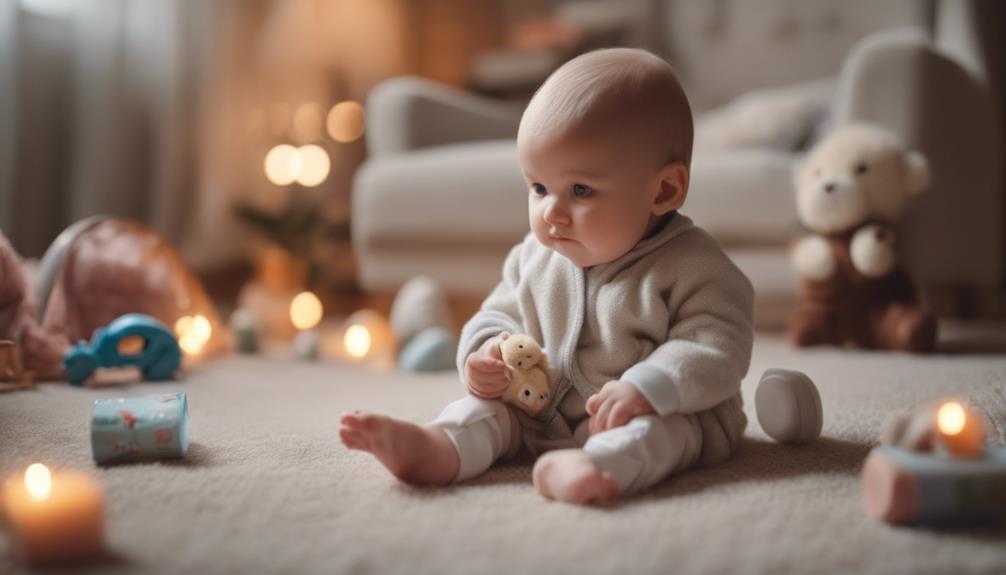
Creating a nurturing environment greatly influences the development of a baby's nervous system. Positive interactions, responsive caregiving, and love are key elements that contribute to healthy brain development, emotional regulation, and bonding.
When caregivers provide emotional support and establish secure attachments, they help regulate the baby's stress response and promote ideal brain wiring. Engaging in activities that foster bonding and emotional connection further enhances the development of the baby's nervous system.
By creating a safe and stimulating environment, caregivers can encourage healthy brain development and overall well-being in infants. These early experiences play a significant role in shaping the neural connections in the baby's brain, setting the foundation for future cognitive and emotional development.
Therefore, prioritizing a nurturing environment is essential for ensuring the healthy growth and functioning of a baby's nervous system.
Interactive Activities for Development
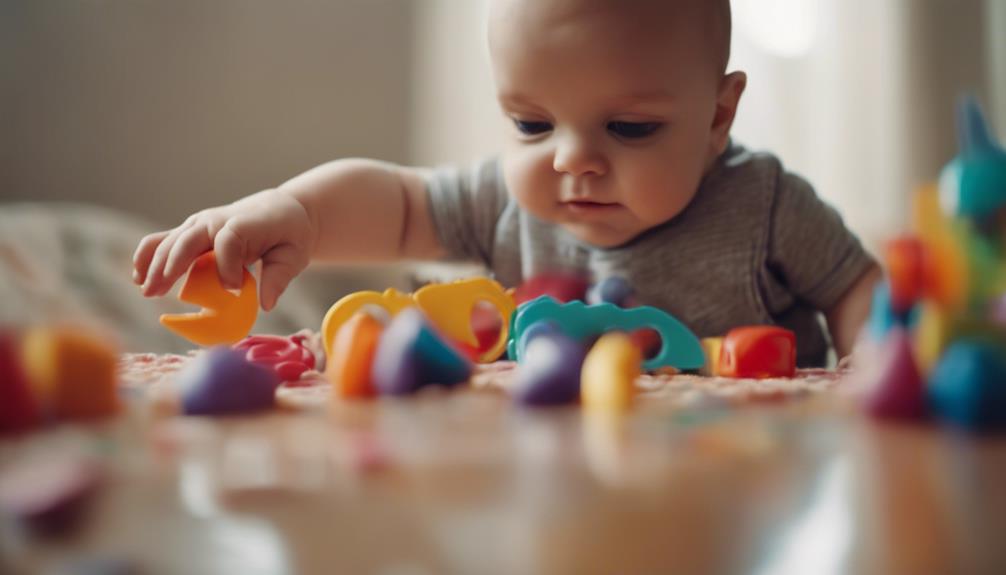
To support your baby's nervous system development, engaging in interactive activities is essential. These activities not only provide opportunities for bonding but also play a vital role in stimulating nerve development.
Here are some interactive activities that can benefit your baby's nervous system:
- Sensory Play: Exploring different textures through activities like playing with sensory bins or feeling different fabrics can help support nerve development.
- Peek-a-Boo: This classic game not only brings joy but also helps strengthen neural connections in your baby's brain.
- Music and Movement Activities: Engaging in activities that involve music and movement can stimulate the nervous system and promote coordination skills.
- Tummy Time Exercises: These exercises are essential for strengthening the muscles and nerves in your baby's neck and back, supporting overall development.
Promoting Healthy Habits
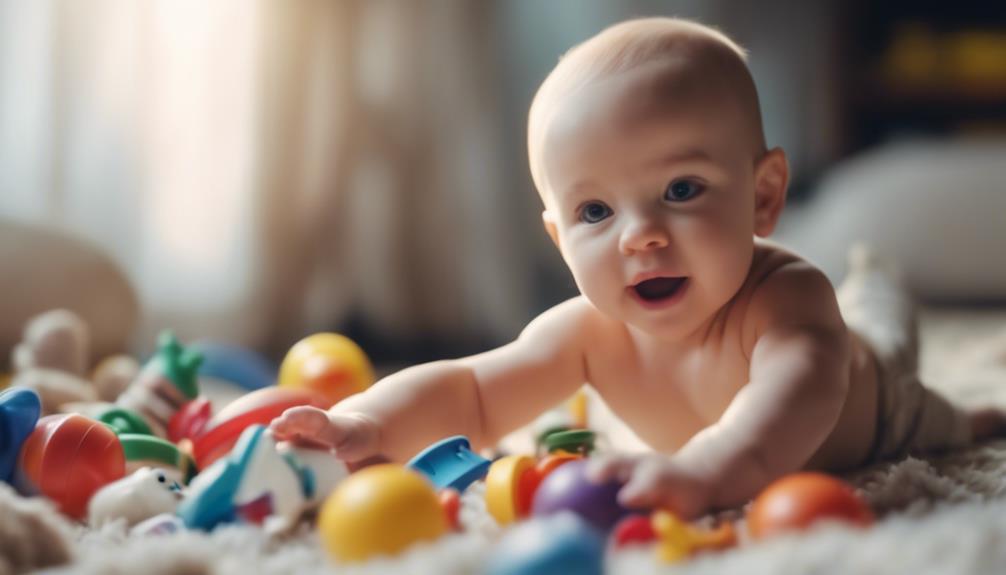
For ideal nervous system development in your baby, focus on promoting healthy habits such as consuming a diet rich in omega-3 fatty acids during pregnancy. Omega-3 fatty acids are crucial for your baby's brain development and can be found in foods like salmon, walnuts, and flaxseeds. Additionally, maintaining a balanced diet and regular prenatal care are essential to boost your baby's nervous system growth. Ensuring you get enough folic acid, at least 400 micrograms daily before and during pregnancy, is vital for your baby's development. Fish consumption is particularly beneficial due to its omega-3 advantages, supporting the growth of the fetal nervous system. Remember to track your pregnancy progress and consult healthcare professionals for guidance to create the best conditions for your baby's nervous system development.
| Healthy Habit | Importance | Food Sources |
|---|---|---|
| Omega-3 Fatty Acids Intake | Crucial for baby's brain development | Salmon, Walnuts, Flaxseeds |
| Folic Acid Consumption | Essential for nervous system development | Leafy Greens, Citrus Fruits |
| Regular Prenatal Care | Vital for promoting optimal nervous system growth | Consult Healthcare Providers |
Recognizing Trauma Signs

Promoting healthy habits like consuming omega-3 fatty acids during pregnancy sets the foundation for your baby's nervous system development, which is vital.
Recognizing trauma signs in your baby is essential for their well-being. Here are some signs to look out for:
- Excessive crying: If your baby cries more than usual without an apparent reason, it could be a sign of trauma.
- Feeding difficulties: Trouble with feeding or sudden changes in eating habits may indicate underlying trauma.
- Behavioral changes: Watch for aggressive outbursts, withdrawal, or regressive behaviors as potential signs of distress.
- Physical symptoms: Keep an eye out for stomachaches, headaches, or unusual changes in your baby's sleep patterns, as these could be linked to trauma.
Recognizing trauma signs early can lead to timely intervention and support for your baby's healthy nervous system development. By staying attentive to these signs, you can help your baby navigate challenges and promote their overall well-being.
Seeking Support and Guidance

Consider reaching out to healthcare professionals for guidance and support in nurturing your baby's nervous system development. Healthcare professionals, such as pediatricians and child development specialists, can provide valuable insights into promoting healthy nervous system growth in your little one. They can offer advice on developmental milestones to track your baby's progress and identify any areas of concern.
Additionally, joining support groups or parenting classes can help you learn effective strategies for stimulating your baby's nervous system in a positive way.
Staying informed about developmental milestones is essential to make sure your baby is on track for healthy growth and development. By seeking guidance from healthcare professionals and staying educated on these milestones, you can address any potential issues early on.
Online resources and books are also valuable tools to expand your knowledge and discover new ways to support your baby's nervous system development. Engaging in activities like tummy time, gentle touch, and soothing sounds can further enhance your baby's sensory experiences and promote overall well-being.
Ensuring Healthy Growth and Development
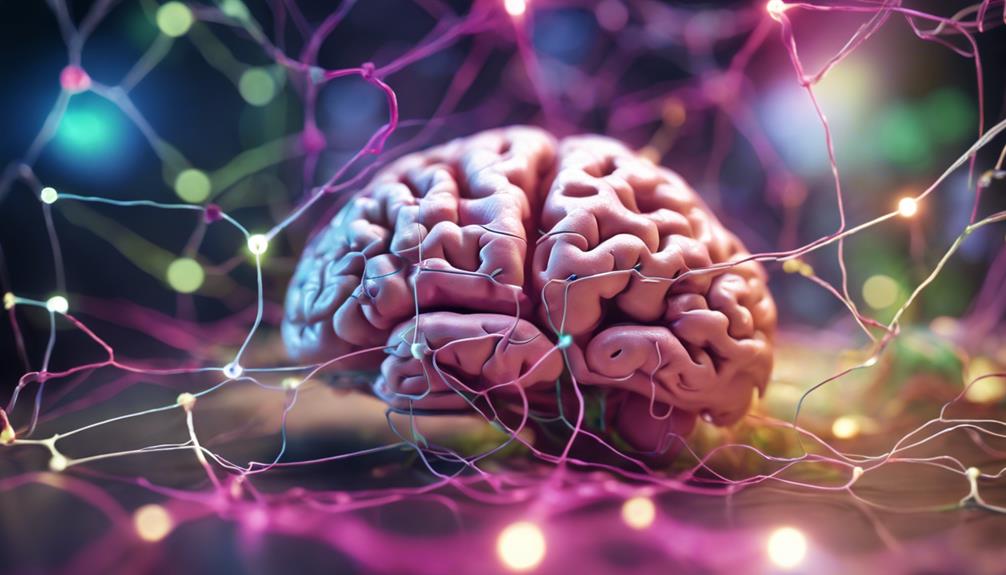
To guarantee healthy growth and development in your baby's nervous system, understanding key milestones and providing proper care from the prenatal stage is essential.
As your baby learns and grows, there are several ways you can help make sure their nervous system develops efficiently:
- Early Formation: The fetal nervous system initiates development at just three weeks post-conception, highlighting the importance of early care.
- Reflex Development: Key reflexes important for your baby's interactions start forming by 12 weeks of gestation, aiding in their sensory experiences.
- Myelin Development: Myelin, essential for nerve communication, begins to develop around 20 weeks, supporting effective signaling in the nervous system.
- Sensory Connections: By around 28 weeks, nerves establish connections with organs, facilitating the functioning of senses as the brain continues to grow.
Frequently Asked Questions
How Does the Nervous System Develop in Infants?
As you grow, your nervous system rapidly develops. The spinal cord and brain stem are well-developed at birth. Over time, the limbic system and cerebral cortex mature, controlling emotions and cognitive functions. Lower brain centers govern basic behaviors like crying and feeding.
What Is Important to a Child's Neurological Development?
To support your child's neurological development, focus on maternal actions like a balanced diet and prenatal care. These factors contribute to healthy brain growth during pregnancy, setting a strong foundation for your baby's future cognitive abilities.
How Do I Know My Baby's Brain Is Developing?
Wondering how to know your baby's brain is developing? Watch for milestones like eye tracking and responsiveness. Look for steady weight gain and engagement. Talk, sing, play, and seek expert advice for best growth.
At What Point Does a Child's Nervous System Begin to Develop?
Your child's nervous system starts developing in the early stages of pregnancy, around three weeks post-conception. By six weeks, the neural tube closes, signaling further growth. Key reflexes emerge by the 12th week, showcasing intricate progression.
Conclusion
In summary, ensuring excellent development of your baby's nervous system is vital for their overall well-being. By understanding the stages of growth, factors influencing development, and promoting healthy habits, you can provide a nurturing environment for your little one.
Remember, recognizing signs of trauma and seeking support when needed are essential steps in ensuring healthy growth and development. Keep up the good work, and your baby will thrive!

